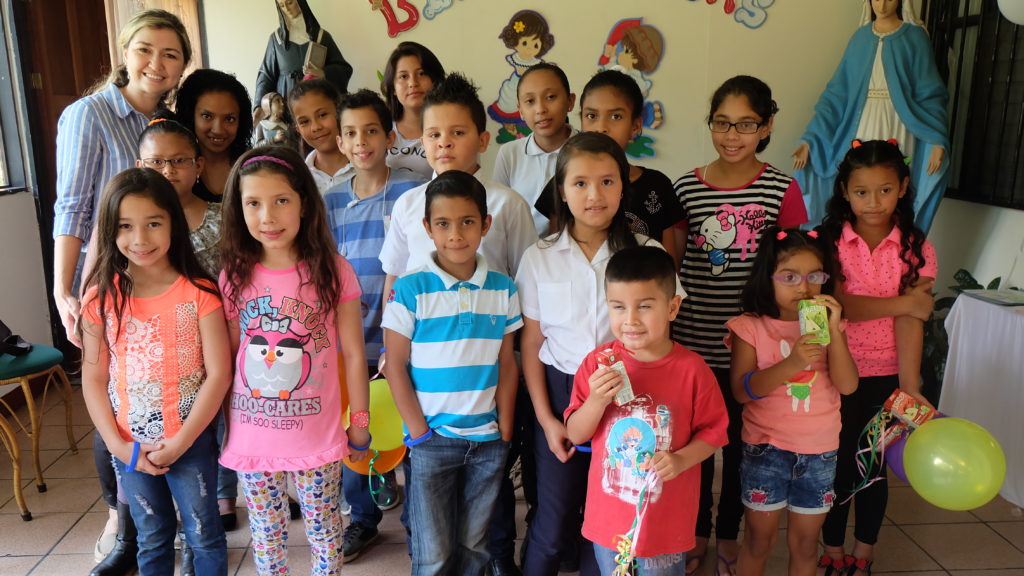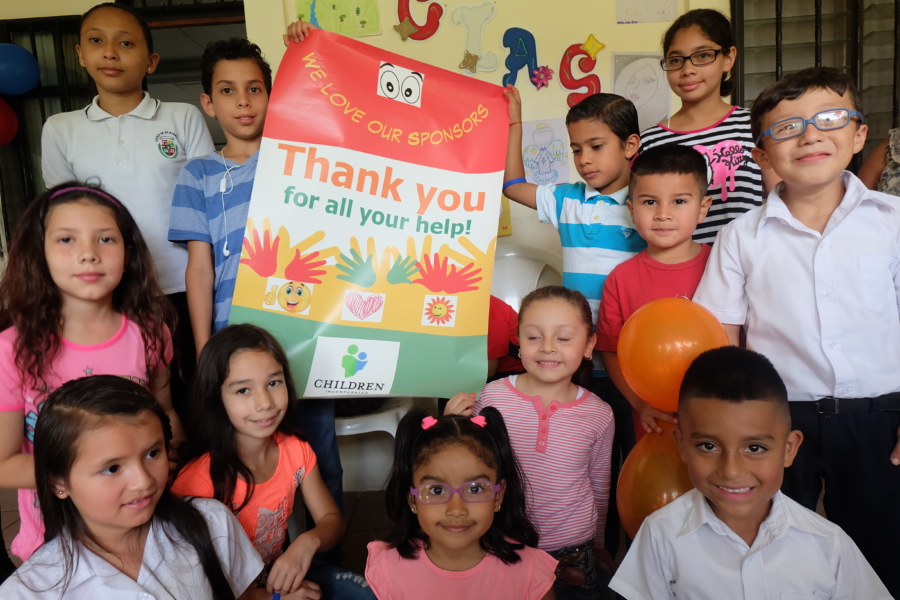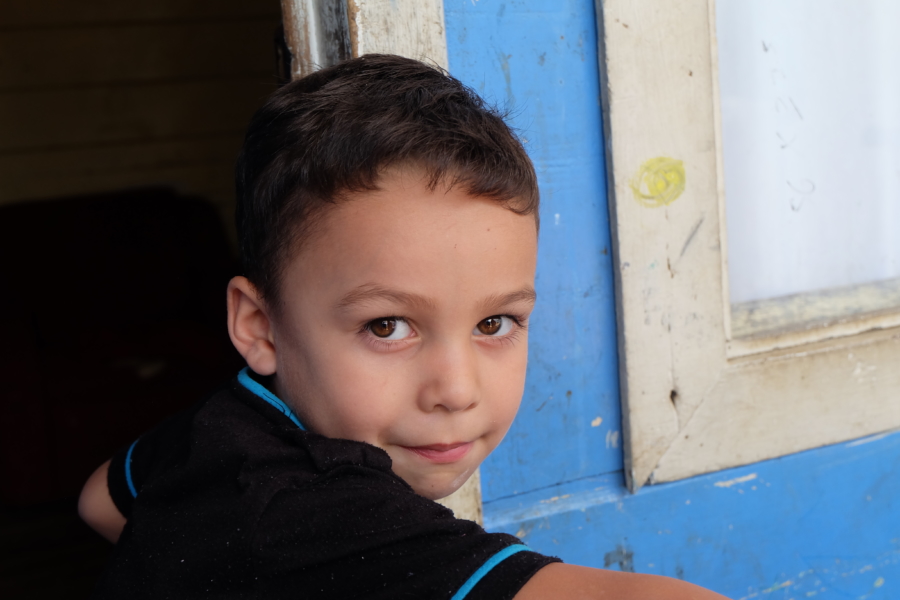In so many countries around the world, drought is a constant worry, causing problems for crop cultivation and keeping impoverished people from having access to drinking water. In San Jose, Costa Rica, in the slum neighborhood that surrounds our affiliate site, La Milagrosa, a welfare center that supports more than seventy sponsored children, families have the opposite problem. Instead of the rainy season bringing relief from arid conditions, it causes those families to fear losing their homes to the mudslides that often come with it.
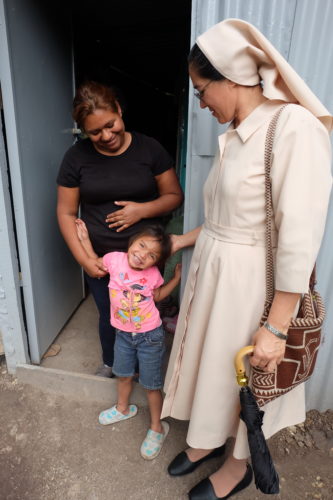
Sister Vielka is pictured with a mother and daughter outside their home.
Costa Rica, with a population of about 4.5 million people — nearly a quarter of whom live in the metropolitan area of the capital and largest city, San Jose — is one of the most stable and prosperous nations in Latin America. Because of that, it’s not cheap to live there and everything is expensive, especially food. But despite the high cost of living there, the country attracts a lot of migrant families.
Costa Rica is surrounded by nations that are much worse off than it is. Nicaragua and Panama have higher poverty rates, less stable governments, a lack of employment opportunities, and violence is more rampant there. This leads families, desperate for better lives for themselves and for their children, to migrate to Costa Rica in search of employment and a safer environment in which to live.
Unfortunately, what they find when they arrive is low-paying jobs for men in construction or field labor; and the only land they find to build on as undocumented immigrants is government-owned and in the hills of San Jose, which is subject to frequent mudslides. The rainy season lasts from May to November, so for half the year, work can be inconsistent, and families are concerned about losing their homes and all their belongings.
The Sun Shines on La Milagrosa
At La Milagrosa, which is run by our volunteer coordinator Sister Vielka, children receive food on a monthly basis, as well as educational support, mostly in the form of encouragement from the Sisters. Most of the children live with their single mothers who struggle to find support in a foreign country. Some receive food stamps from the government, but most are trying to get by on their own, away from their home country and extended family.
Six Sisters live at the home, and they not only make sure the children are fed, but they also offer emotional support to the mothers, who might find work cleaning houses or doing laundry. But those jobs fill only for a few hours a week, which isn’t enough — and it causes them a great deal of stress. The Sisters talk with the women about their issues, and counsel them through tough times.
Instead of the rainy season bringing relief from arid conditions, it causes those families to fear losing their homes to the mudslides that often come with it.
As we visit with the children at the home, Sister Vielka explains that they have to turn in their report cards and show passing grades in order to stay in our program. She says that this rule has been working really well to not only motivate the children, but also to keep their mothers engaged in their learning.
The Sisters would love to one day run an after-school tutoring program so that the children could receive additional support; that would require funding to hire a teacher to work with the kids. La Milagrosa is currently not receiving any support from the government or elsewhere, and there are few resources outside of Children Incorporated sponsorship to do more to support the kids’ education.
When It Rains, It Pours
We left La Milagrosa in the early afternoon to walk through the neighborhood to visit the homes of some of our sponsored children. It was a bright and cool day, and there was not a cloud in the sky. We walked with Sister Vielka and her assistant Gisela down a steep hill, and then down a dirt path covered by giant, lush tropical plants, taking us off the main road into what felt like a jungle within a city.
Gisela told us that seven years ago, rain took five houses from families in the middle of the night. Luckily, the occupants were able to get out safely in time, but they all lost everything they had in the mudslide.
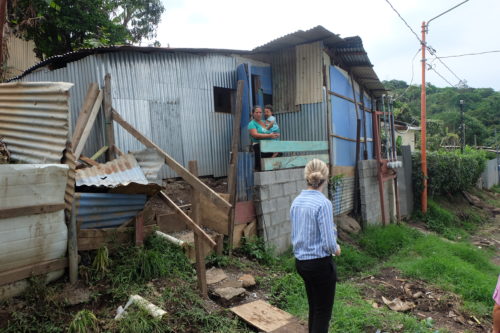
Andreia Beraldo, International Project Specialist, outside the home of a family who lost their bathroom to a mudslide last month.
We walked up tightly-packed dirt steps that had been carved into the side of the mountain to reach our first home, where a woman greeted us in the doorway. When we walked into the living room, she pointed to the floor with one hand, as she held her small baby in the other arm, and told us that the floor used to extend further out — but rain had washed part of it away, exposing the ground below and leaving a huge hole in their home.
It seems like only a matter of time before the rest of the floor will go sliding down with the rain, leaving this family homeless. Last month, rain took out their bathroom, which had been on the side of the house. When we walked outside to leave, we could see what was left of a small structure where there was no longer a toilet, but only another hole left in the ground on the property.
With each home visit, we seemed to go further and further up into the hills. Since the land is owned by the government, the families risk not only having their homes wash away in the rain, but also being removed at any point. Gisela explained that when it rains a lot, the children aren’t able to get to school, because it becomes too dangerous for them to be walking around.
After visiting four or five houses, we could see why so many of our conversations with families and the Sisters were about the rain. Each house was barely clinging to the blanket of dirt beneath it on a dry day like that day — looming on all of our minds was what will happen when the rain inevitably comes.
As we walked back to La Milagrosa, the clouds started to come in heavily; and in the distance, we could hear the rumble of thunder. By the time we reached the Home, it had started to pour.
***
HOW DO I SPONSOR A CHILD IN COSTA RICA?
You can sponsor a child in Costa Rica one of three ways – call our office and speak with one of our sponsorship specialists at 1-800-538-5381, email us at sponsorship@childrenincorporated.org, or go online to our donation portal, create an account, and search for a child in Costa Rica that is available for sponsorship.

